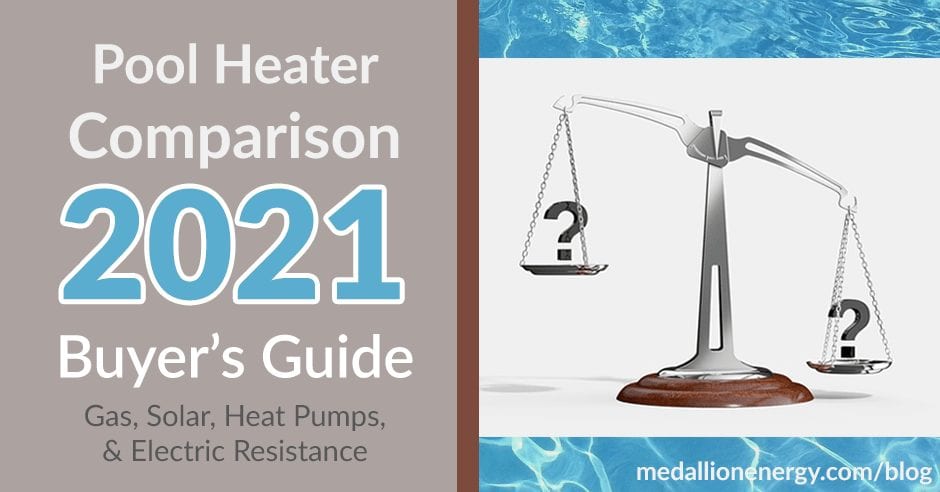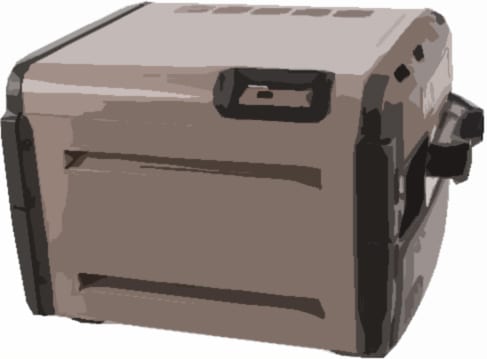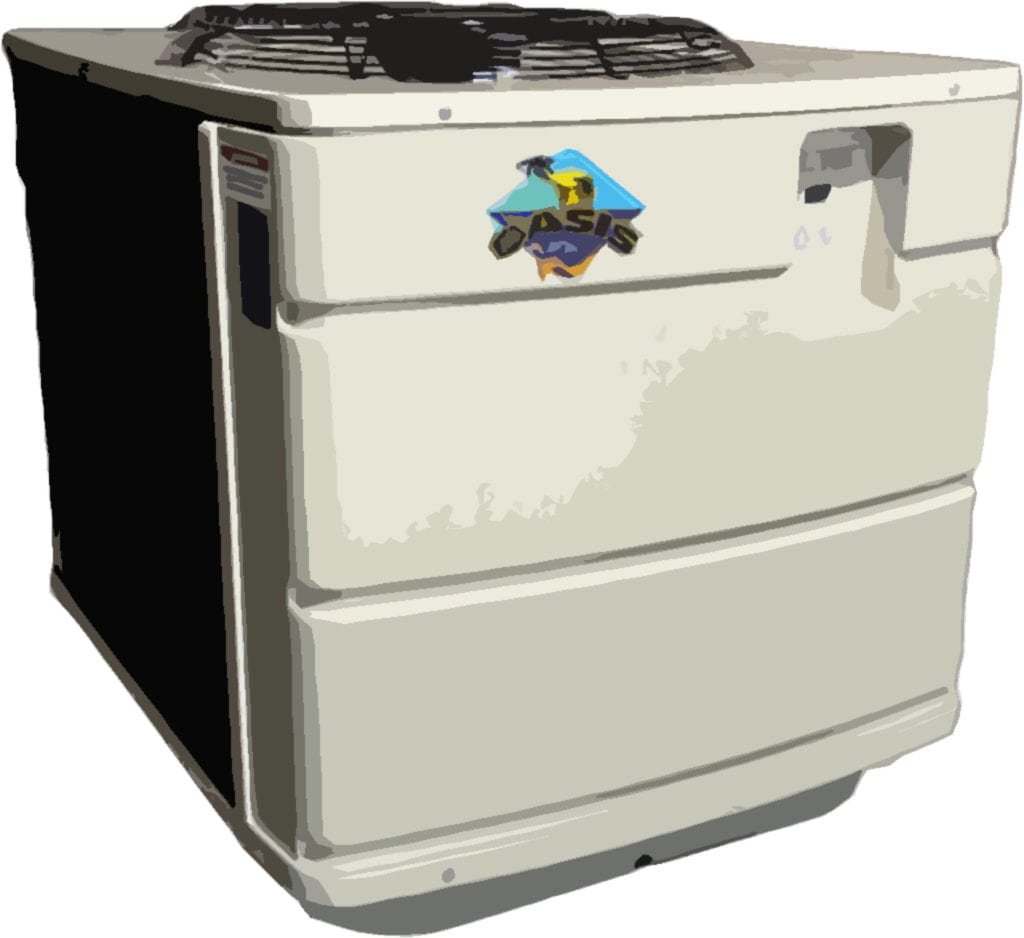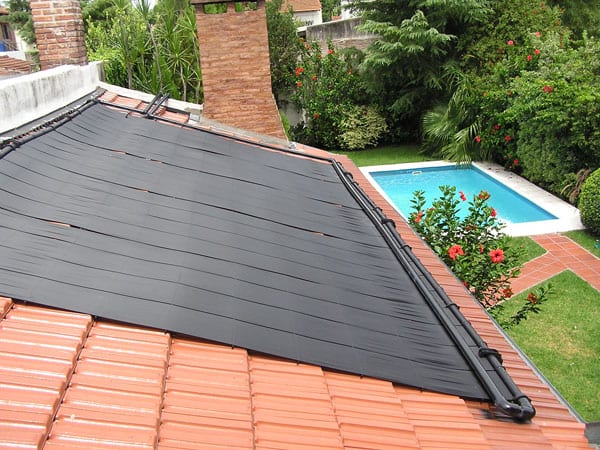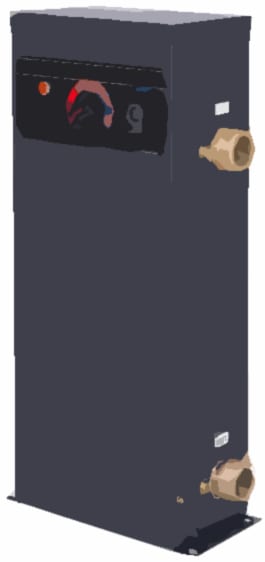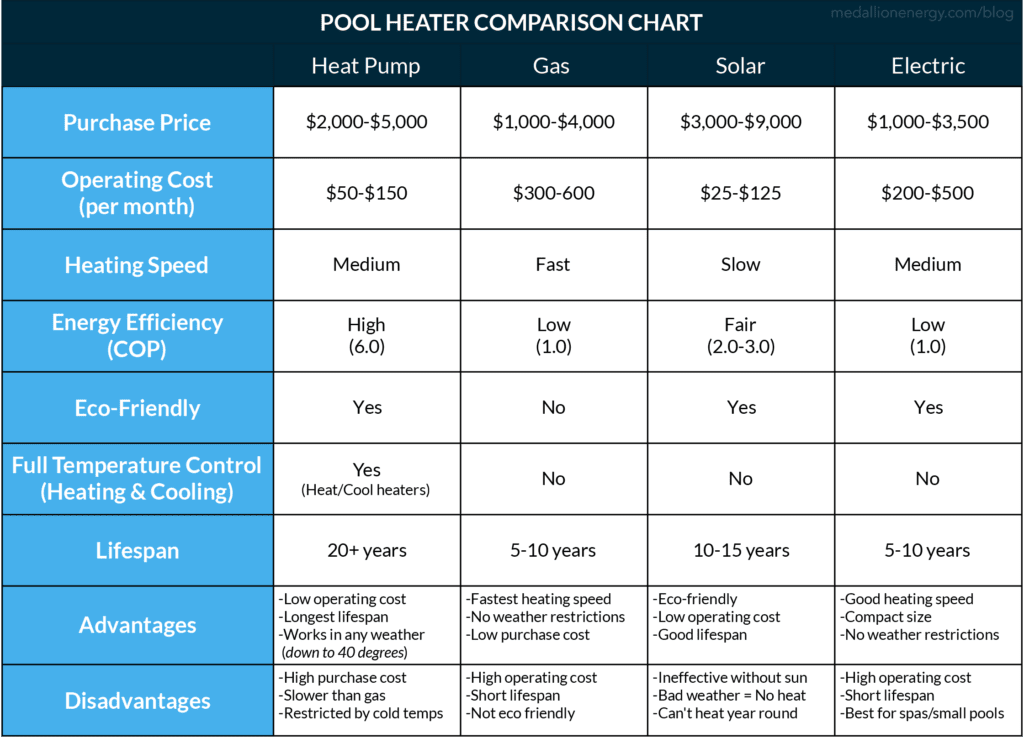Want to buy the best pool heater in 2021? Learn everything you need to know in this pool heater comparison & buyer’s guide
If you made it here then odds are you’re looking to buy a pool heater. But as you know, there are tons of pool heating methods to choose from. So how do you choose the best pool heater?
Choosing the best pool heater is easy when you break it up into these 3 key points:
- Understanding why you want a pool heater
- Knowing the differences between the different types of pool heaters
- Knowing how much each pool heater will cost or save you
Maybe you want a pool heater to warm up your water so that you can swim more comfortably. Or maybe you want to extend your swim season, or beat the weather, and get more time in the pool year-round.
Whatever your reasons may be, once you know, the next part is easy. It’s just a matter of knowing what your pool heating options are, and which ones suit your needs best.
What are the different types of pool heaters?
There are 4 types of pool heaters that you can use to heat your pool:
- Pool Heat Pumps
- Solar Pool Heaters
- Gas Pool Heaters
- Electric Pool Heaters
In the next few sections, we’ll cover each pool heater, and help you understand how they work, and what sets them apart. With that said, it’s time to compare pool heating methods and find out which one is best for you.
The Definitive
Pool Heater Comparison & Buyer’s Guide
2021
Gas Pool Heaters
Gas pool heaters use natural gas or propane to produce heat and work well in very cold climates. They’re often used in spas and small outdoor pools.
How Does a Gas Pool Heater Work?
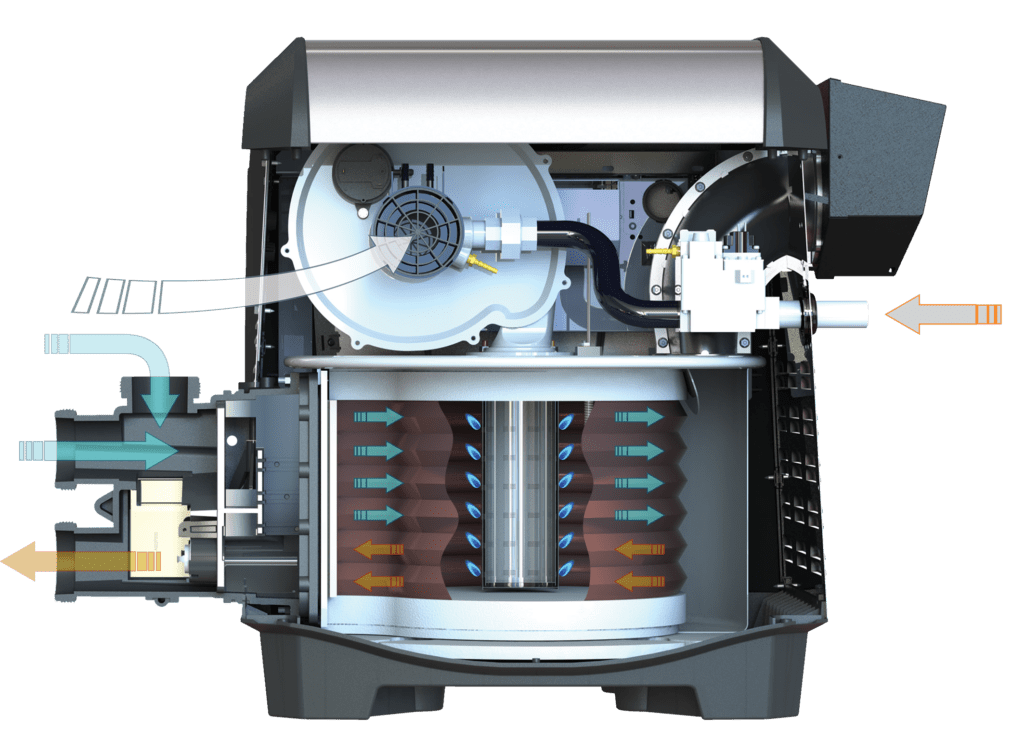


Gas pool heaters require a constant fuel supply from either natural gas or propane in order to work. The fuel supply can be delivered through an existing natural gas line, or a dedicated propane tank depending on the model of the gas heater.
As water flows through a gas heater, it passes through the combustion chamber. In the combustion chamber, fuel (gas or propane) burns to produce heat, which then gets sent to the heat exchanger.
Here, the heat dissipates into the water as it flows through the heat exchanger, which contains a hot metal tube within a larger PVC pipe. As the water warms up, it flows back into your pool, and the process repeats.
Types of Gas Pool Heaters: Natural Gas vs Liquid Propane Pool Heaters
As mentioned earlier, natural gas pool heaters receive their fuel supply from city gas lines — so if you have gas lines in your home, then you can use one.
But if you don’t have natural gas available, then liquid propane pool heaters serve as a good alternative. They work similar to gas pool heaters and cost around the same upfront.
With that said, there is a catch — liquid propane pool heaters require a steady fuel supply from a large propane tank. A propane tank you have to purchase and install in addition to your pool heater.
Not to mention that propane costs anywhere from 2-3x as much as natural gas, which is already on the higher end of operating costs. So between the two, gas pool heaters tend to be favored over propane.
Millivolt vs Electronic Ignition Pool Heaters: Which is better?
Another feature that sets gas pool heaters apart is the type of ignition they use. Millivolt pool heaters use a small amount of gas to keep a pilot light-lit, similar to old-style gas stoves. The pilot light allows the heater to quickly start on demand.
Of course, a few obvious tradeoffs to the convenience of millivolt pool heaters are the constant need for fuel (keeping the flame lit), and the risk of starting a small gas leak if the pilot light goes out.
This is exactly why more and more gas pool heater manufacturers are switching to electronic ignition pool heaters.
Electronic ignition gas pool heaters work just like modern gas stove stops, where a small, electric spark ignites the burners. With electronic ignition heaters, both fuel use and the risk of gas leaks become reduced significantly, hence why they’re more popular.
The Difference Between Low NOx and Normal Emissions Gas Pool Heaters
Let’s start by saying that no gas pool heater is zero-emissions or environmentally friendly. They all produce some level of C02 emissions.
However, in recent years, gas pool heater manufacturers made an effort to reduce the carbon footprint of gas heaters. In comes Low NOx gas heaters.
Low NOx gas pool heaters work just like normal emissions gas pool heaters, but with two BIG differences:
- They’re designed to release fewer emissions and meet the NOx Emission standards enforced by California and Texas
- Low NOx gas heaters work more efficiently than regular gas heaters, thanks to their low emissions
How Much Do Gas Pool Heaters cost?
The purchase price of gas pool heaters ranges from $1,000 to $4,000. Price is mostly determined by the size, brand, and type of heater you’re purchasing.
Related: 20 Swimming Pool Myths DEBUNKED
Cost To Run a Gas Pool Heater
Unfortunately, a gas pool heater’s greatest strength, speed, comes at an even greater cost. On average, gas pool heaters cost anywhere from $300-$600 per month to run.
And don’t forget what we said earlier about propane costing twice as much as gas. For propane users, operating costs are even higher.
So at this point, it’s no secret that while gas heaters offer the fastest speed, they’re also the most expensive, by far.
How To Size a Gas Pool Heater
In order to size a pool heater, you need to know:
- How hot you want your pool to be
- The coldest average temperature of the year in your state
- The surface area of your swimming pool (Width x Length = Surface Area)
With that information together, you’re ready to size your pool heater. Thankfully, sizing a gas pool heater is the same as sizing a pool heat pump, so just follow these 5 easy steps below:
(OR skip the math and use our FREE Pool Heater Sizing Calculator)
How To Size a Pool Heater
- 1.) Determine the hottest temperature you want to heat your water up to. This is your target temperature
- Ex.) A target temperature of 80 degrees
- 2.) Find the average temperature of the coldest month of the year for the area you live in
- Ex.) If you live in Florida, the coldest average temperature during swim season could be 60 degrees
- 3.) Subtract the coldest average temperature from the target temperature
- Ex.) 80 degrees (target temperature) – 60 degrees (coldest average temperature) = 20 degrees
- For the example, 20 degrees is your Temperature Increase number
- Ex.) 80 degrees (target temperature) – 60 degrees (coldest average temperature) = 20 degrees
- 4.) Calculate the surface area of your pool
- Use this formula to calculate your pool’s surface area:
- Width x Length = Surface Area
- Ex.) 15ft x 30ft = 450 sq. ft. (Surface Area)
- Use this formula to calculate your pool’s surface area:
- 5.) Calculate the amount of heating power (BTUs) needed to heat your pool
- You already have all the numbers you need, so here’s the formula:
- Pool Surface Area x Temperature Increase x 12 = BTUs needed
- Ex.) 450 x 20 x 12 = 108,000 BTUs
- You already have all the numbers you need, so here’s the formula:
According to the above example, a pool heater of at least 108,000 BTUs would be ideal.
IMPORTANT: Another major factor to consider when buying a gas pool heater, is the distance between the installation point and the gas meter. A distance that’s too far may not allow your heater to work properly with the gas meter, regardless of proper sizing.
What are BTUs?
A BTU, or British Thermal Unit, represents the amount of energy needed to increase the temperature of one pound of water by one degree Fahrenheit. In pool heating, they’re used to size pool heaters and measure their “heat output”.
The BTU output of most pool heaters ranges from 50,000 to 500,000 BTUs. Keep in mind that BTUs are only a unit of measurement, and not reflective of a pool heater’s build quality or performance. In other words, more BTUs doesn’t necessarily mean better, it just means more heat output.
Pros and Cons of Gas Pool Heaters
Gas Pool Heater Pros
- Fastest heating speed
- Works in any weather
- Lower purchase cost
Gas Pool Heater Cons
- Not eco-friendly, produces C02 emissions
- Most expensive to run; $300-$600 per month
- Short lifespans (5-10 years)
- May require propane tanks
How to Buy The Best Gas Pool Heater
Are you someone who lives in a very cold climate, where natural gas is available? If so, you may consider using gas pool heaters.
If you want to buy the best gas pool heater, then make sure it meets these standards:
- Low NOx emissions
- Has an electronic ignition
- Uses gas (not propane)
- Is wind resistant
- Has good manufacturer support
Pool Heat Pumps
Pool heat pumps stand as one of the most energy-efficient and eco-friendly pool heating options available. They achieve this by harvesting natural heat from the surrounding air and compressing it to warm up your pool water. No gas needed.
This feature keeps the operating cost and carbon footprint of pool heat pumps exceptionally low, at nearly 80% cheaper than gas or electric.
How Do Pool Heat Pumps Work?
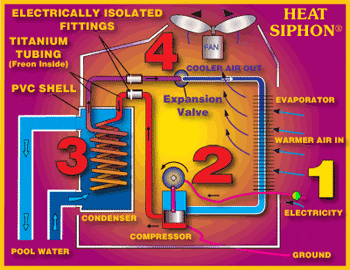


Pool heat pumps extend your swim season by using warm air and energy-efficient compression to heat up your pool in temperatures all the way down to 40 degrees. This means that as long as it’s above 40 degrees outside, you’re swimming comfortably — rain or shine, spring or fall.
So how exactly do they do it? It’s simpler than you might think.
Here’s a quick breakdown of how pool heat pumps work:
- The pool heat pump receives water from the filter pump
- A spinning fan on top of the heat pump pulls in warm, ambient air over the evaporator coil
- Evaporator coil extracts heat from the air
- The extracted heat warms the coil’s liquid refrigerant into a warm vapor
- The compressor pressurizes the warm vapor into a hot gas, increasing its temperature
- Hot gas travels through and warms the inner tubes of the heat exchanger
- Pool water flows through the heat exchanger and gets warmed up
- The hot gas turns back into liquid refrigerant as it cools down and exits the heat exchanger
- Cooled liquid refrigerant travels through an expansion valve and back to the evaporator coil, cooling down even more
- Process restarts
How fast does a pool heat pump heat up a pool?
As far as heating speed goes, pool heat pumps are fairly quick. They’re much faster at heating your pool than solar pool heaters but slower than gas pool heaters. And the warmer it is outside, the faster they work.
Types of Heat Pump Pool Heaters
When it comes to pool heat pumps, some manufactures, like Oasis, offer enhanced versions of their most popular models. One of the most popular enhancements is a pool cooling feature or built-in pool chiller.
Heat pumps with this feature are known as heat-cool pool heat pumps.
With certain models of pool heat pumps, like the Oasis Platinum Heat-Cool, you can warm up AND cool down your pool with the touch of a button.
And while that may not seem like a big deal at first, consider this:
- What happens if you accidentally leave your heater running all night?
- What if your pool gets uncomfortably hot on a sunny day?
- Or simply put, what if you want to LOWER the temperature of your pool?
Unless you’re using a heat-cool pool heat pump that can cool down your water, your only option is to sit, wait, and HOPE that your pool cools down in time. And sometimes that can mean not getting to swim at all.
This is precisely what makes buying a pool heater with a cooling option so worthwhile. Heat-Cool pool heat pumps not only extend your swim season, but offer you MORE control and flexibility over the temperature of your pool than ANY other pool heater can.
So bottom line, when it comes to buying a pool heat pump you have two options:
- Regular Pool Heat Pump
- Heats in any weather down to 40 degrees
- Heat/Cool Pool Heat Pumps
- Heats & cools in any weather down to 40 degrees
How Much Do Pool Heat Pumps Cost?
The purchase price of pool heat pumps ranges from $2,000 – $5,000, with pricing depending on the size of the heater, brand, and features included.
NOTE: While pool heat pumps can have higher initial purchase costs, they’re also known for having the longest lifespans (15-20+ years)
Cost To Run a Pool Heat Pump
Pool heat pumps stand as the second most affordable pool heater next to solar heaters.
On average, pool heat pumps cost around $50 – $150 to run per month, which is about 80% cheaper than gas.
But guess what?
It gets even more affordable if you use this one neat trick: use a pool cover.
Pool covers help keep the heat locked into your pool, which easily doubles the efficiency of your pool heat pump, and reduces your heating costs even more.
Related: 7 Cheap Ways To Heat Your Swimming Pool
Understanding COP (Coefficient of Performance): The Energy Efficiency Rating of Pool Heat Pumps
COP, or Coefficient of Performance, is a number that measures the ratio between the amount of energy an appliance produces to the amount it consumes. Or in pool heating, the amount of heat a pool heater generates per unit of energy (electricity, gas) it draws.
Most COPs range between 2.0-8.0, which equates to 200%-800% efficiency.
The formula for calculating a unit’s COP looks like this:
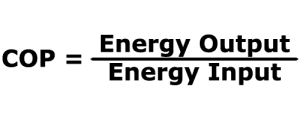


The higher a pool heater’s COP, the more energy-efficient it is. For example, if a pool heat pump has a COP of 6, then that means for every unit of energy it consumes, 6 units of heat are produced.
That’s highly efficient, especially when compared to gas pool heaters with an average COP of 1. That makes pool heat pumps six times more energy efficient!
How To Size a Pool Heat Pump | What Size Pool Heater Do I Need?
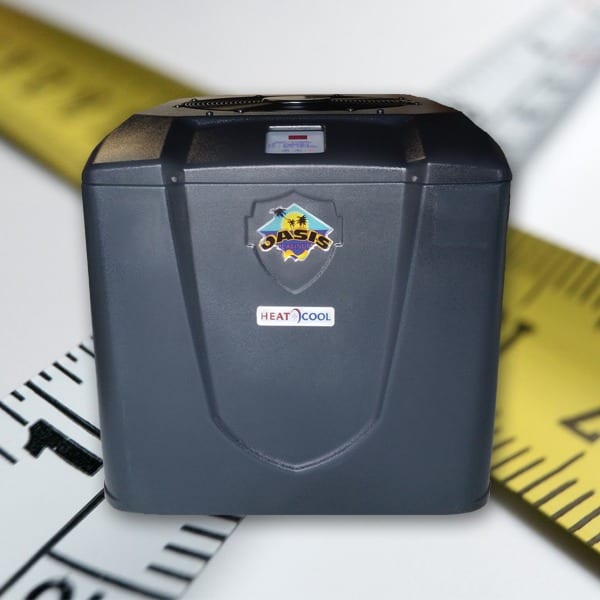


To size your pool heat pump, you can:
- Use our FREE Pool Heater Sizing Calculator
- Check out the pool heater sizing steps from earlier
- Read this post on How To Size a Pool Heater
Pros and Cons of Pool Heat Pumps
Pool Heat Pump PROs
- Eco-friendly, zero emissions
- Works in any weather down to 40 degrees
- Cost-effective to run; 80% cheaper than gas
- Long lifespans: 20+ years
- Pool chiller feature available for enhanced temperature control
Pool Heat Pump CONs
- Higher initial purchase cost
- Lower performance in freezing temperatures
- Slower heating speed than gas pool heaters
- Requires electrical breaker
How To Buy The Best Pool Heat Pump
Are you someone who lives in a state with mild, to warm weather? Do you reside anywhere in the north, west, or south? If so, pool heat pumps can be a great option for you.
If you decide to buy a pool heat pump, here’s what to look out for:
- Proper sizing
- High COP (higher COP = higher energy efficiency)
- Heat/Cool pool chilling feature
- Good service and parts availability
- Easy to use controls & automation capabilities
- Good service and parts availability
Related: How To Buy The Best Pool Heat Pump: Pool Heat Pump Comparison Guide
Solar Pool Heaters
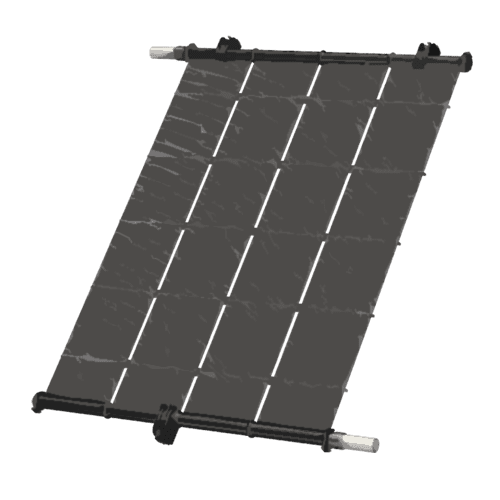


Solar pool heaters are powered by your pool filter pump, and work by sending water to a set of solar panels that collect solar heat, and transfer it to your water as it flows through. From there the warm water flows back into your pool, and the process repeats.
Since solar pool heaters rely on your pump, solar panels, and sunshine to work, they use the least amount of energy to run and therefore offer some of the most affordable pool heating available. At the same time, their dependence on the sun is also a considerable drawback, and we’ll explain why soon.
How Do Solar Pool Heaters Work
In order to understand exactly how a solar pool heater works, it’s important to remember that it isn’t a single unit, but rather two separate parts working together as one. Your pool pump moves water through your solar panels, and the solar panels warm that water up as it flows back into your pool.
This is why solar pool heaters are often referred to as solar pool heating systems, because well, they ARE a system.
With that said, here’s a more detailed breakdown of how solar pool heaters work:
- 1.) The pool pump sends water through the pipes to a diverter valve
- 2.) A diverter valve sends water up the pipe leading to the solar panels
- Solar panels are usually positioned on top of a roof, a fence, or a ground-level platform facing the south
- 3.) Water slowly travels up through the panels, heating as it passes through
- 4.) Heated water travels down the panel’s outlet pipe
- 5.) A check valve, which prevents back cycling between cold and heated water, directs warm water into the pool
- 6.) The cycle repeats
Of course, it’s important to mention that in order for all of that to work as planned, a solar pool heater needs a steady supply of sunshine. Without it, there’s no solar heat to collect, and therefore no way to warm up your water.
At the same time, even with direct sunlight, solar heaters will only work well if the ambient temperature is warm (60+ degrees). Hence why weather and temperature restrictions, are one of the main drawbacks of solar heaters.
For these reasons, solar pool heaters are most popular in warm, sunny states.
Types of Solar Pool Heaters
Solar pool heating systems fall into one of two categories, based on what type of panels/solar collectors they use:
Unglazed collectors, or unglazed solar panels, are typically made of a series of propylene mats or heavy-duty plastic panels, which contain small tubes within them for water to travel through from bottom to top. Two PVC tubes hold the panels together, with one serving as the entry point and the other as the exit for your pool water.
Glazed collectors, or glazed solar panels, are comprised of a solid aluminum frame housing two heat-tempered glass solar panels, and a series of copper pipes running within. Glazed solar panels cost more, but offer superior heat transfer and durability compared to unglazed panels.
How Much Does a Solar Pool Heater Cost?
Of all the pool heating methods available, solar pool heaters offer the most affordable heating per month, with pool heat pumps close in second.
On average, the price of solar pool heaters ranges from $3,000 – $9,000. The initial cost is based on a few factors, including:
- The amount of work needed for installation
- The size of your pool
- The type of panels you purchase
- Your available sun exposure
Cost To Run a Solar Pool Heater
The cost to run a solar pool heater each month ranges between $25 – $125, with costs mostly depending on how often you run your solar pool heating system. So yes, while the solar panels certainly do harvest “free heat”, it comes at the cost of running your pool pump.
With that said, the “energy efficiency” of a solar pool heating system also affects how much you’ll pay each month. But solar pool heater energy efficiency is measured with something very similar to Coefficient of Performance, known as Solar Energy Factor (SEF) and Solar Fraction (SF).
How To Measure Solar Pool Heater Energy Efficiency
Solar Energy Factor (SEF)
Solar Energy Factor represents the amount of heat energy produced by a solar system, divided by the amount of energy (electricity) consumed. Just like with Coefficient of Performance, the higher a solar heater’s SEF, the higher its energy efficiency.
SEFs range from 1.0 – 11.0, with the average falling between 2.0 and 3.0.
Solar Fraction (SF)
Solar Fraction represents your system’s solar contribution to water heating. The higher this number is, the less energy required by your backup pool heater.
SFs range on a scale of 0-1.0, with an average between 0.5-0.75.
How To Size a Solar Pool Heater
Since solar panels themselves don’t actually use energy to work (only your pool pump uses energy), the process for sizing a solar pool heater is a little bit different. But don’t worry, it isn’t complicated.
According to our friends at SwimUniversity, the surface area of your solar collectors should equal about 75% of your pool’s surface area. And if you keep your pool open year-round, you can bump that up to 100%.
For a 16×32 ft. pool, you multiply 16 by 32 to get a 512 sq. ft. surface area. This means that you would need 512 sq. feet of solar panels/collectors to properly heat your pool.
IMPORTANT: Solar pool heating systems also require a pool pump that’s strong enough to move water through the entire solar panel system. In most cases, this means upgrading to a larger pool pump OR buying an additional pump to work with the one you already have.
Pros and Cons of Solar Pool Heaters
Solar Pool Heater PROS
- Affordable pool heating for warm climates
- Eco friendly
- Medium lifespan (10-15 years)
Solar Pool Heater CONS
- Doesn’t work without sunlight
- Restricted by weather (rain, clouds, snow) and cool temperatures
- Not ideal for year-round heating
- Often require the purchase of a larger pool pump
How to Buy The Best Solar Pool Heater
If you’re someone who lives in a warm climate with lots of sunshine, solar pool heaters can work as a great heating option for you. While they won’t work year-round in any weather, they’ll help keep your water warm and give you more time in the pool.
If you decide to buy a solar pool heater, keep these key points in mind:
- Choose glazed collectors over unglazed
- Parts availability and support
- Good manufacturer warranty
- Make sure your pump can support your new pool heater
Electric Pool Heaters (Electric Resistance Pool Heaters)
Electric pool heaters, or electric resistance pool heaters, use energy to generate heat and work best for small inground pools, small above-ground pools, and spas. Since they’re entirely powered by electricity, they’re one of the most expensive heaters to run for regular-sized pools.
How Do Electric Pool Heaters Work?
Electric pool heaters draw energy from an external power source to heat up a resistor.
The resistor acts as the unit’s heating element and warms up your pool water as it passes through.
Once the target temperature is reached, water continues flowing and cools down the heating element. From there, the cycle repeats.
How Much Do Electric Pool Heaters Cost?
The purchase price of Electric Pool Heaters ranges from $1,000 – $3,500. While these heaters do offer faster heating speeds, they also have the shortest lifespan at an average of 5 years.
In many cases, electric pool heaters require heavy wiring and amperage, which increases the installation cost.
Cost To Run An Electric Pool Heater
The average cost to run an electric pool heater ranges between $300 – $600.
While electric pool heaters DO run on electricity, they’re not designed with energy efficiency in mind. They work a lot like an electric stovetop, which draws energy to warm up a heating element beneath the cooking range. And as you can imagine, the more you cook, the faster that adds up.
So knowing that electric pool heaters work very similar to stoves, it’s easy to see why they cost so much to operate, and why they’re best suited for smaller pools and spas. For reference, with a COP of 1.0, these electric pool heaters literally consume six times more energy than pool heat pumps to produce the same amount of heat.
Pros and Cons of Electric Pool Heaters
Electric Pool Heater PROS
- Fast heating speeds
- Works in any weather
- Compact in size
Electric Pool Heater CONS
- Expensive to operate
- A short lifespan (5 years)
- Little troubleshooting and support availability
- Designed mostly for use with small pools and spas
Pool Heater Comparison: A few pool heater FAQs
What is the most cost-effective pool heater?
The most cost-effective pool heater is a pool heat pump used with a solar blanket. A pool heat pump draws warmth from the air and uses it to warm up your pool, while a solar blanket keeps the heat locked in.
Solar heaters also offer cost-effective heating, but don’t perform as well since they depend on sunshine and good weather.
What is the most efficient way to heat a swimming pool?
The most efficient way to heat your pool is to keep it covered and run your heater at night when electrical use is the cheapest.
Are new pool heaters more efficient?
A used pool heater can be just as efficient as a new pool heater if it’s serviced each year to maintain performance. This is why servicing your pool heater is year is so beneficial — it keeps it working at peak energy efficiency, which keeps your pool bills low.
Pool Heater Comparison Chart
Need an easy way to compare pool heating methods? Use this pool heater comparison chart to find the best pool heaters for 2021.
What’s the best pool heater for a pool?
With the pool heater comparison chart above, you can easily see which pool heater aligns best with your needs. It mostly comes down to your budget, how much temperature control you want, and how much you want to extend your swim season throughout the year.
Choosing a Pool Heater
- Gas and electric pool heaters offer fast, weatherproof heating, but cost the most run
- Pool heat pumps offer reliable and energy-efficient heating that works great in any weather down to 40 degrees
- Solar heaters offer the most low-cost pool heating but don’t work year-round and depend on the sun to perform well
Here are a few more tips to help you decide which pool heater is best for you, based on where you live:
- If you live in the north: gas pool heater OR pool heat pump
- North with no gas lines: pool heat pump
- If you live in the south: pool heat pump OR solar pool heater
- If you live in the west: pool heat pump OR low-NOx gas pool heater
- Alternative options: a flexible, and highly energy-efficient combination of two pool heaters
- Pool Heat Pump + Solar Pool Heater
- Electric Pool Heater + Solar Pool Heater
If you liked this post, you might also like:
New Pool Owner 101: 9 Essential Tips for New Pool Owners
33 Backyard Inground Pool Ideas For All Budgets
9 Best Ways To Cool Down Your Pool & Lower Water Temperature

